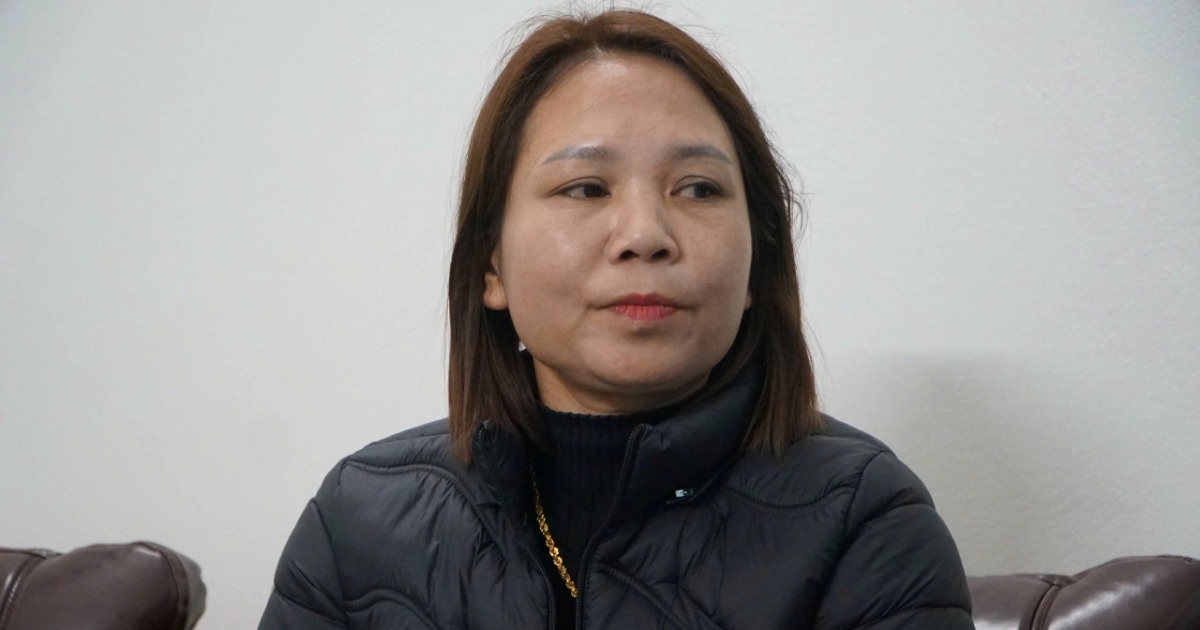Bị chặt đốt ngón tay vì chạy trốn
Ba ngày qua, căn nhà của gia đình ông Lê Ngọc Xuyên (SN 1950), ở thôn 6, xã Quảng Thái, huyện Quảng Xương, tỉnh Thanh Hóa) đầy ắp tiếng cười. Đông đảo người thân, hàng xóm qua chúc mừng ông đã gặp được con gái lưu lạc suốt 32 năm là chị Lê Thị Hòa (SN 1977), vừa trở về từ Trung Quốc.
Được gặp người thân sau hơn 3 thập kỷ xa cách, chị Hòa dù gặp khó khi phát âm tiếng Việt nhưng vẫn nhớ rõ tên, tuổi của 7 anh chị, em trong nhà. “Hơn 30 năm qua, tôi nhớ mọi người rất nhiều, không lúc nào thôi nghĩ về người thân và quê hương. Đặc biệt là mẹ, chỉ tiếc rằng ngày tôi trở về, mẹ đã không còn nữa”, chị Hòa tâm sự.
Chị Lê Thị Hòa vui mừng khi đoàn tụ cùng gia đình sau 32 năm xa cách (Ảnh: Thanh Tùng).
Chị kể, chị là con gái thứ ba trong gia đình có 8 anh chị em. Năm 1993, khi 16 tuổi, do gia đình đông anh em, được một người quen ở xã kế bên rủ đi làm ăn ở Trung Quốc, chị đã đồng ý. Nhưng khi sang đến nơi, chị bàng hoàng biết mình bị bán cho một người đàn ông hơn 13 tuổi, ở tỉnh Quảng Châu, Trung Quốc.
Những tháng ngày làm vợ bất đắc dĩ cho một người đàn ông không quen biết, không có tình cảm, chị Hòa sống như cảnh “địa ngục trần gian”. Chị bị biệt giam, không cho ra khỏi nhà và thường xuyên hứng những trận đòn từ người chồng vũ phu.
“Mỗi lần tôi nhớ bố mẹ, gia đình là ông ấy đánh tôi. Hầu như ngày nào tôi cũng bị đánh. Sống cùng ông ấy, tôi bị giam lỏng, đến cả đi chợ mua thức ăn ông ấy cũng không cho đi”, chị Hòa kể.
Chị Hòa bên người cha đã xa cách hơn 3 thập kỷ (Ảnh: Thanh Tùng).
Người phụ nữ cho hay, sau một năm chung sống cùng người chồng Trung Quốc, vì không chịu được cảnh bạo lực của chồng, chị đã tìm đường chạy trốn. Tuy nhiên, lần chạy trốn ấy cũng khiến chị phải hứng chịu trận đòn nhừ tử.
“Tôi bỏ trốn vào rừng và bị chồng bắt được, ông ấy chặt mất một đốt ngón tay út của tôi và dọa nếu còn ý định bỏ chạy sẽ chặt cả bàn tay. Từ đó tôi không dám bỏ trốn nữa”, chị Hòa nói.
Chung sống được ít năm, chị Hòa sinh cho người đàn ông Trung Quốc một cậu con trai. Năm 2016, người này qua đời, chị Hòa sinh sống cùng con trai và 2 cháu. Đây là khoảng thời gian chị mới tìm lại sự sống sau nhiều năm bị người chồng vũ phu bạo hành.
Ngón tay út của chị Hòa bị người chồng vũ phu chặt mất một đốt (Ảnh: Thanh Tùng).
Đến năm 2018, chị yêu và kết hôn với một người đàn ông hơn mình 1 tuổi và chung sống đến hiện tại. “Trước khi cưới tôi, anh ấy là người độc thân. Khi nghe tôi kể về quá khứ của mình, anh ấy rất thương và thấu hiểu, yêu quý tôi rất nhiều. Chúng tôi đang làm nghề buôn bán bánh kẹo ở khu chợ nhỏ của tỉnh Quảng Châu. Tôi cảm thấy rất hạnh phúc khi ở bên anh ấy”, chị Hòa chia sẻ.
Đốt 16 giàn pháo hoa ăn mừng cuộc đoàn tụ kỳ diệu
Chị Hòa cho biết, dù cuộc sống cùng người chồng mới rất hạnh phúc nhưng trong tiềm thức, chị vẫn thường xuyên dò hỏi các thông tin từ những người quen biết để tìm lại bố mẹ và người thân đã xa cách hàng chục năm.
“Từ năm 2022, tôi đã có ý định sẽ tìm cách liên hệ với gia đình ở quê. Chồng tôi cũng rất ủng hộ và tìm cách giúp tôi tìm lại gia đình. Nhưng vì nơi tôi sinh sống rất ít khi gặp người Việt nên không có cách nào liên hệ được với người thân để trở về”, chị Hòa nói.
Cho đến cuối năm 2024, trong lần đi đưa hàng, vợ chồng chị Hòa gặp được một người phụ nữ Việt, là thương lái sang mua hàng. Người phụ nữ này tham gia các nhóm thiện nguyện và thường xuyên giúp những người có hoàn cảnh như chị Hòa tìm lại người thân.
Chị Hòa cùng người thân trong gia đình (Ảnh: Thanh Tùng).
Qua trao đổi, chị Hòa viết tên quê quán, danh sách các thành viên trong gia đình cho người phụ nữ để nhờ về quê hương tìm gia đình. Đúng ngày mùng 5 Tết Ất Tỵ, người phụ nữ và một tài xế về thôn 6, xã Quảng Thái, huyện Quảng Xương để tìm người thân giúp chị Hòa.
Tình cờ trong lúc hỏi thăm, người phụ nữ tốt bụng gặp anh Lê Ngọc Hào (SN 1975, anh trai chị Hòa). Sau khi kiểm tra tên tuổi từng thành viên nhà anh Hào, người phụ nữ xác định đây đúng là người thân của chị Hòa nên đã gọi điện để hai bên gặp nhau.
“Khi nhìn danh sách họ tên do người phụ nữ cung cấp, tôi mừng đến phát khóc. Qua cuộc gọi video tôi nhận ra người trong điện thoại chính là em gái. Lúc đó cả gia đình tôi như vỡ òa vì sung sướng”, anh Hào nói.
Sau khi xác nhận đầy đủ thông tin, tối mùng 6 tháng Giêng, theo lời chỉ dẫn của người phụ nữ, anh Hào cùng toàn thể thành viên trong gia đình bắt xe ra Móng Cái (Quảng Ninh) để đón em gái trở về đoàn tụ.
Ông Xuyên xúc động trong ngày gặp lại con gái bị lưu lạc (Ảnh: Thanh Tùng).
Sáng mùng 7 tháng Giêng, chị Hòa cùng người thân có mặt ở quê nhà xã Quảng Thái trong niềm vui ngập tràn. Để ăn mừng ngày đoàn tụ, anh Hào và các anh chị em làm mâm cỗ mời bà con hàng xóm đến chung vui.
“Đây là một mùa xuân vô cùng đặc biệt với cả gia đình. Suốt nhiều năm tìm kiếm thông tin về em nhưng không có tung tích gì, tôi thật không thể ngờ, sau 32 năm xa cách, cả nhà lại được gặp lại em. Ngày hôm đó tôi đã đốt 16 giàn pháo hoa để ăn mừng, có thể nói đây là cái Tết đáng nhớ nhất đối với gia đình tôi”, anh Hào nói.
Chia sẻ về dự định trong thời gian tới, chị Hòa cho biết, đang liên hệ với chính quyền địa phương để làm căn cước công dân và các thủ tục giấy tờ liên quan. Thời gian này, chồng của chị cũng đang làm thủ tục giấy tờ hợp pháp để qua thăm gia đình.
“Sau khi chồng sang chơi, chúng tôi sẽ quay trở lại Trung Quốc để sinh sống rồi mỗi năm sẽ sắp xếp thời gian về thăm gia đình. Mấy hôm ở Việt Nam, chồng nhớ tôi và gọi điện liên tục, anh ấy rất tuyệt vời, nếu không có anh ấy thì tôi không thể tìm được người thân của mình”, chị Hòa nói.
Source link: https://dantri.com.vn/xa-hoi/nguoi-phu-nu-tim-duoc-gia-dinh-sau-32-nam-bi-lua-ban-sang-trung-quoc-20250207172722441.htm



